Special note
For anyone who is out of the loop on local movie theater news, the Carolina Hollywood (formerly the Regal Hollywood 14) is closed from Tuesday, May 26, till their grand reopening as the Carolina Asheville on Friday, June 5. It will be interesting to see the changes in both appearance and approach to programming. Anyone who’s been out there during the earlier stages of their renovations knows the cosmetic changes are pretty sweeping and have so far resulted in a certain “roughing it” atmosphere. (A few other critical sorts and I will get a full dose of that when we go to a press screening of Rian Johnson’s The Brothers Bloom at the theater this week. We were advised to bring our own chairs.) All that should be different by next Friday.
New in theaters
It’s an interesting week at the movies with Pixar’s new film Up and Sam Raimi’s “return to horror” Drag Me to Hell (wait, didn’t Night at the Museum 2 do that to me last week?) vying for our moviegoing attention. I don’t think there’s much doubt as to who is going to win this contest. Pixar has an unbeatable track record at the box office—and for once (see my review in Wednesday’s Xpress), I’m with them all the way. But don’t sell Raimi short here.
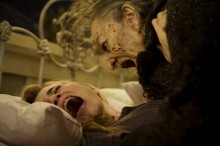
The Raimiphiles are anxious over the PG-13 rating and the lack of Bruce Campbell—both of which are understandable from a Raimiphile standpoint. The former is more generally understandable since PG-13 horror often gets a bad rap that is equally as often deserved. Still, there are exceptions and this could be one of them. The trailer looks kind of cool in a jokeshop/spookhouse manner and the structure of the story seems to be grounded in Jacques Tourneur’s Night of the Demon (1957)—I will gladly sit through the next five Friedman-Seltzer movie spoofs without grumbling if Drag Me to Hell gets within miles of that film.
Otherwise, the only thing new on the horizon is the French film Paris 36, a period musical that has opened to wildly mixed reviews and a tepid box office. With this in mind—and the fact that Is Anybody There? did fairly well and Valentino: The Last Emperor picked up—the Fine Arts is only booking Paris 36 for one show a day (the 7:20 p.m. slot). The “art” film scene has been a little on the lame side so far this year, so I’m personally inclined to try just about anything.
Noteworthy DVD releases
This looks like the week that movies that didn’t really make it into theaters—like Killshot and Forever Strong (memo to theaters: you can toss those trailers and posters now)—make it to DVD. I’m not sure that makes them noteworthy, though. I have some marginal interest in Killshot, but never had any intention of seeing Forever Strong (that’s why Justin Souther was born). The romantic comedy New in Town comes out, too. I saw that in the theater, so I know better than to let it into my house.

More interesting are the DVD releases of Michaelangelo Antonioni’s Zabriskie Point (1970) and David Cronenberg’s M. Butterfly (1993). The former is famous—or infamous—as Antonioni’s sometimes-comprehensible look at America and his call for a rejection of American materialism, hence the exploding appliances scene. Though it wasn’t exactly a success at the time, I knew at least one person who took it to heart and decided that washing machines were the only cultural advantage of living in America. Since he found personal hygiene an overrated commodity at best, I doubt the idea of losing washing machines troubled him much to begin with.
Cronenberg’s M. Butterfly is one of the filmmaker’s least appreciated works—perhaps because it’s one of his most normal works. Though that’s a relative concept, since we’re here dealing with a man (Jeremy Irons) who has a nearly 20-year-long affair with a transvestite (John Lone) without knowing the object of his obsession isn’t a woman. Though less outre than most of Cronenberg’s films, the preoccupation with sexual identity is central to much of the filmmaker’s work. Perhaps it’s time to re-evaluate this work.
Notable TV screenings
Philo Vance Marathon TCM, Wednesday, May 27, starting at 6 a.m.
The Laurel-Hardy Murder Case (1930), The Bishop Murder Case (1930), The Kennel Murder Case (1933), The Dragon Murder Case (1934), The Casino Muder Case (1935), The Garden Murder Case (1936) and Calling Philo Vance (1940)
OK, TCM is cheating a little here, since the 1930 short The Laurel-Hardy Murder Case only sounds like it should be a Philo Vance movie, owing to the “Murder Case” in the title. It’s actually an old dark-house comedy/mystery—and not one of the boys’ better films, though it’s agreeable enough and has surprisingly high production values and elaborate camera work. In any case, it isn’t a spoof on the then-popular detective series in any way.
The Philo Vance movies are an odd lot. Paramount started filming S.S. Van Dine’s mystery novels with William Powell in 1929 with The Canary Murder Case, which is about as close to unwatchable as you can get and still—with a little determination—make it to the end. That it wasn’t very good didn’t keep it from being popular (things don’t change much in that regard), so they followed it up with the vastly superior The Greene Murder Case (1929) and The Benson Murder Case (1930), both also starring Powell. (The latter is almost nothing like the novel, which is a good thing if you’ve ever read the novel—easily the weakest of the lot.)
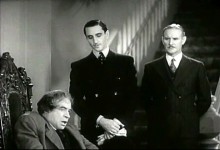
For whatever reason, Van Dine’s The Bishop Murder Case was snatched up by MGM in 1930, so that studio made their own Philo Vance film with Basil Rathbone (really too British to be Vance) in the lead. Although it’s a bit on the clunky side, the film is a fairly faithful and very atmospheric—atmospheric to the point of nightmarish—rendering of the book. But this is where the trouble begins and the sense of there being no definitive Philo Vance sets in. The film wasn’t a success.
Three years passed and Warner Bros. bought The Kennel Murder Case and returned William Powell to the role. With Michael Curtiz directing, the film was far and away the best of the very loosely organized series. It’s the sort of movie that’s so cleverly made that even people who don’t tend to like “old movies” tend to like it. But Powell was soon on his way to greener (at least monetarily) pastures at MGM, which found the Warners shunting Warren William (their somewhat bargain version of both John Barrymore and Powell) into the role. William was a perfectly good Vance and The Dragon Murder Case wasn’t—and isn’t—a bad movie. Problem was William was also playing another screen sleuth, Perry Mason, about the same time. Mason was more modern and popular, so they let the series drop.
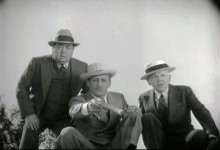
MGM picked it up and did the strangest thing yet with The Casino Murder Case (1935): They cast Paul Lucas as Philo Vance. If Rathbone had been too British, Lukas was too Hungarian. The movie wasn’t bad, but the Vance was all wrong. It probably then seemed like a good idea to bring in the very American Edmund Lowe for The Garden Murder Case (1936), though Lowe was too roughneck for the part of a sneeringly intellectual playboy detective, and the film was no great shakes either.
Once again, the series was allowed to drop—though The Scarab Murder Case (1936) was made in England with Wilfrid Hyde-White (no prints are known to exist). For whatever reason, this was Paramont’s cue to remake The Greene Murder Case as a B picture called Night of Mystery (1937), which somewhat bizarrely prompted Warren William to be brought back for The Gracie Allen Murder Case (yes, as in George Burns and Gracie Allen) in 1939. It’s a curio, a one-shot and not at all bad—if you like Gracie Allen. It’s too bad that this one is almost never shown and this set doesn’t change that.
Instead we get Warner Bros. last gasp at a semi-respectable Philo Vance movie, Calling Philo Vance (1940). The fact was that no one was calling for Philo Vance and that was that (until the character name—if not much else—came back briefly in poverty-row cheapies in the late 1940s).
Jungle Jim-athon TCM, Wednesday, May 27, starting at 3:45 p.m.
Jungle Jim (1948), Jungle Jim in the Forbidden Land (1949) and Jungle Manhunt (1951)
No, these aren’t any good, really, but they’re entertaining cheese that shows what happens when an aging and increasingly pudgy Johnny Weissmuller meets up with the schlockmeister Sam Katzman. Katzman (sometimes called Jungle Sam) offered the retiring Tarzan the role of Jungle Jim—a kind of low-rent Tarzan in safari clothes. There were ultimately 16 of these things (in the last three, they dropped the Jungle Jim name and just called the character Johnny Weissmuller). TCM is only offering a taste of them. It is perhaps just as well. Proceed at your own peril.
The Wrong Box (1966), TCM, Saturday, May 30, 1:15 a.m.
Bryan Forbes’ black comedy The Wrong Box should be on the very, very short list of movies in need of a DVD release. This adaptation of a book by Robert Louis Stevenson (yes) and Lloyd Osbourne is one of the gems of 1960s comedy. The cast is perfect: Ralph Richardson, John Mills, Michael Caine, Peter Cook, Dudley Moore, Wilfrid Lawson and Peter Sellers. I won’t even carp about Forbes casting his wife, Nanette Newman, as the love interest for Caine. The story concerns the last surviving members of a venture called a tontine (“named after Lorenzo Tonti, a banker of Neapolitan persuasion,” Richardson constantly reminds us). This is an arrangement where a sum of money is set aside and invested for a group of children until the last person alive gets the lot.

The last surviving members—Richardson and Mills—are estranged brothers who cordially detest each other. Actually, most people dislike Richardson, who’s a “pedantic, boring old poop” with a penchant for reciting facts nonstop. (“I state facts only—no opinions—and this fascinates everyone I meet.”) Mills, however, plans on murdering him so his grandson (Caine) will get the money. Richardson, on the other hand, has his own venal adopted nephews—Cook and Moore—who are after the money for themselves. It all leads to a train wreck, mass confusion, the mangled body of a serial killer mistaken for Richardson, plots, counterplots, Peter Sellers as the cat-loving drunken Dr. Pratt (“I was not always as you see me now. The sick and groggy used to queue at my door. I specialized, you see, in rare marine diseases of the spleen”)—and a chase with horse-drawn hearses. Do not miss it.
Leo McCarey Festival, TCM, Monday, June 1, starting at 7:30 a.m.
Once Upon a Honeymoon (1942), Love Affair (1939), The Milky Way (1936), The Kid From Spain (1932), Duck Soup (1933), The Bells of St. Mary’s (1945) and The Awful Truth (1937)
Monday, June 1, starts TCM’s Great Directors Month, and their first round is devoted to Leo McCarey, who is certainly on my list of great directors. At the same time, I have to say that I don’t entirely understand the logic of their choices, and I certainly don’t understand the haphazard order in which they’re programmed. Actually, the features are preceded by three Charley Chase shorts that McCarey directed in the silent era, making the leap to 1942 even harder to grasp. I’d go so far as to say that if you’re not familiar with McCarey’s work, don’t start with Once Upon a Honeymoon. You might go no further. Oh, it’s not a bad movie exactly—certainly it’s well-intended—but it’s an awkward blend of comedy-star vehicle for Cary Grant and Ginger Rogers and a serious drama about Nazis.
Love Affair is much surer ground—and is even more instructive as concerns McCarey’s work if you’ve seen his better-known remake, An Affair to Remember (1957), with Cary Grant and Deborah Kerr. The original with Chales Boyer and Irene Dunne is still a blend of romantic comedy and pure soap opera. The stories are the same. Even parts of the screenplay are interchangeable, but Love Affair is a lot more compact at 88 minutes. The remake clocks in at 119, and the extra half hour does it no favors. It’s partly a case of 1939 sensibilities vs. 1957 ones, which is to say that an 88-minute A picture from 1939 isn’t unusual, but is unthinkable in 1957. However, that kind of bloat started with McCarey years earlier (with Once Upon a Honeymoon, in fact) and is symptomatic of a director who got duller and duller as he got more “serious.”
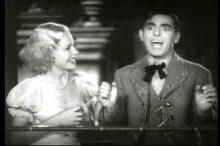
The Milky Way isn’t prime McCarey either. It’s more a Harold Lloyd vehicle than a McCarey film, and it feels very odd in that it’s positioned between two key McCarey films: Ruggles of Red Gap (1935) and Make Way for Tomorrow (1937), neither of which are included here. McCarey managed to make comedy-star vehicles that worked both as McCarey films and as solid star comedies, but this isn’t one of them. That becomes obvious when The Milky Way is put alongside the Eddie Cantor musical comedy The Kid from Spain (1932) and the Marx Brothers in Duck Soup (1933). These are both essential McCarey and are thankfully on right after the Lloyd picture.
The Bells of St. Mary’s (1945) is McCarey’s immediate follow-up to his wildly successful Going My Way (1944), which had introduced the world to the idea of Bing Crosby as a kind of hep-singing priest. It’s hard to resist Going My Way, but less difficult to do so with the sequel. At the time, one critic remarked that this was “too much of a good Bing.” I’d tend to agree.
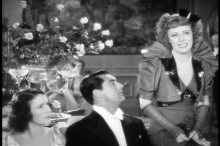
Thankfully, the set concludes with McCarey’s 1937 The Awful Truth—the film that finally made Cary Grant into a full-blown movie star. This is definitely a McCarey high point, even though it was made under less than ideal circumstances. It marked his first and only association with Columbia Pictures and studio boss Harry Cohn. McCarey so disliked Cohn that he and screenwriter Vina Delmar worked on the script for the film in a car parked outside the studio. He only went inside the studio when he was shooting. (McCarey was hardly alone in this. Harry Cohn is the man about whom Red Skelton quipped, “It just goes to show if you give the people what they want, they’ll turn out,” in reference to the throngs at Cohn’s funeral.) None of this tension shows on the screen.
Frank Capra Festival Take Two TCM, Tueday, June 2, starting at 8 p.m.
It Happened One Night (1934), Mr. Smith Goes to Washington (1939), You Can’t Take it With You (1938), Arsenic and Old Lace (1944) and Platinum Blonde (1931)
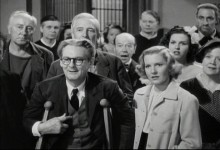
It’s interesting to compare this Frank Capra set with the one TCM did last week on early Capra films—the only one to make this block of movies is Platinum Blonde. This is more the standard Capra playlist—though I would have opted for Mr. Deeds Goes to Town (1936) as a far more pertinent work than You Can’t Take It with You. These are good films for the most part, but the zip and visual creativity that was evident in those earlier Capra films has started to be overwhelmed by Capra’s debatable populist message and a tendency to pad the running times. It’s interesting that in his autobiography Capra talks about doing away with fancy dissolves and scene transitions and just cutting to the heart of his scenes. That may be true, but he seems to have lost sight of how to pare away the number of scenes in the bargain. Even so, these are a pretty good representation of Capra and of what is generally meant when one talks about a Frank Capra film.



Does [i]Up[/i] actually live up to the praise it’s been getting?
I just completely forgot tomorrow is Wednesday, so there is no need to answer that question.
Thanks for the interesting history on Philo Vance films. William Powell may very well be my favorite actor from Hollywood’s Golden Age, but I’ve only seen The Kennel Murder Case with respect to his turns as Philo. Now if I could only get TCM…
I’ve only seen The Kennel Murder Case with respect to his turns as Philo.
Unfortunately, the other three — four, if you count his appearance in Paramount on Parade where he and Clive Brook as Sherlock Holmes match wits with Warner Oland as Dr. Fu Manchu — are Paramount pictures that are now controlled by Universal as part of the TV package acquired by MCA (Universal) in the late 1950s. The films do exist, but no one seems to think they’ve any real commercial value. That may be true. Canary is definitely rather poor. On the other hand, The Greene Murder Case and The Benson Murder Case aren’t bad at all.
Now, TCM does occasionally get films from Universal, so they conceivably could play these. Convincing them to do so might be another matter.